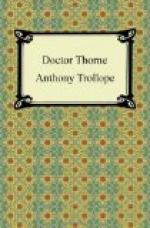There was a great deal of eloquence heard in Barchester on that day. Sir Roger had by this time so far recovered as to be able to go through the dreadfully hard work of canvassing and addressing the electors from eight in the morning till near sunset. A very perfect recovery, most men will say. Yes; a perfect recovery as regarded the temporary use of his faculties, both physical and mental; though it may be doubted whether there can be any permanent recovery from such a disease as his. What amount of brandy he consumed to enable him to perform this election work, and what lurking evil effect the excitement have on him—of these matters no record was kept in the history of those proceedings.
Sir Roger’s eloquence was of a rough kind; but not perhaps the less operative on those for whom it was intended. The aristocracy of Barchester consisted chiefly of clerical dignitaries, bishops, deans, prebendaries, and such like: on them and theirs it was not probable that anything said by Sir Roger would have much effect. Those men would either abstain from voting, or vote for the railway hero, with the view of keeping out the De Courcy candidate. Then came the shopkeepers, who might also be regarded as a stiff-necked generation, impervious to electioneering eloquence. They would, generally, support Mr Moffat. But there was an inferior class of voters, ten-pound freeholders, and such like, who, at this period, were somewhat given to have an opinion of their own, and over them it was supposed that Sir Roger did obtain some power by his gift of talking.
‘Now, gentlemen, will you tell me this,’ said he, bawling at the top of his voice from the portico which graced the door of the Dragon of Wantley, at which celebrated inn Sir Roger’s committee sat:—’Who is Mr Moffat, and what has he done for us? There have been some picture-makers about the town this week past. The Lord knows who they are; I don’t. These clever fellows do tell you who I am, and what I’ve done. I ain’t very proud of the way they’ve painted me, though there’s something about it I ain’t ashamed of either. See here,’ and he held up on one side of him one of the great daubs oh himself—’just hold it there till I can explain it,’ and, he handed the paper to one of his friends. ‘That’s me,’ said Sir Roger, putting up his stick, and pointing to the pimply-nosed representation of himself.
’Hurrah! Hur-r-rah! more power to you—we all know who you are, Roger. You’re the boy! When did you get drunk last?’ Such-like greetings, together with a dead cat which was flung at him from the crowd, and which he dexterously parried with his stick, were the answers which he received to this exordium.
‘Yes,’ said he, quite undismayed by this little missile which had so nearly reached him: ’that’s me. And look here; this brown, dirty-looking broad streak here is intended for a railway; and that thing in my hand—not the right hand; I’ll come to that presently—’




